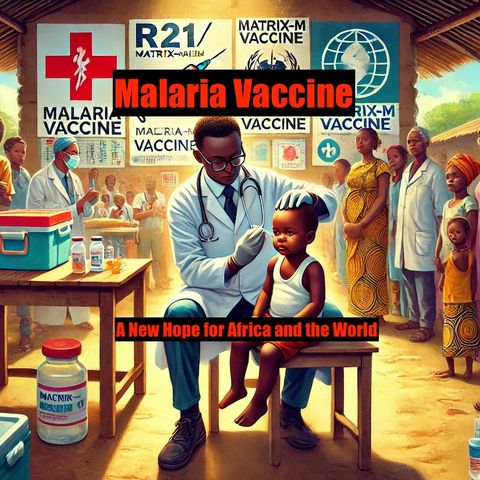Groundbreaking Malaria Vaccine Offers Unprecedented 75% Efficacy, Transforming the Global Health Landscape

Download and listen anywhere
Download your favorite episodes and enjoy them, wherever you are! Sign up or log in now to access offline listening.
Groundbreaking Malaria Vaccine Offers Unprecedented 75% Efficacy, Transforming the Global Health Landscape
This is an automatically generated transcript. Please note that complete accuracy is not guaranteed.
Description
In an unprecedented achievement for global health, researchers have developed the first highly effective malaria vaccine, offering hope in the battle against one of the most deadly and prevalent diseases...
show moreMalaria, caused by Plasmodium parasites transmitted through the bites of infected female Anopheles mosquitoes, has been a major health challenge, particularly in sub-Saharan Africa. The World Health Organization estimates that in 2021, there were nearly 247 million cases of malaria worldwide and 619,000 deaths, with children under five years old being the most vulnerable group.
The new vaccine, developed through extensive international collaboration, has undergone rigorous testing in multiple phase three clinical trials across several countries most burdened by the disease. The studies revealed an efficacy rate of over 75% in preventing malaria cases, a significant leap from previous vaccines, which only showed about 30% effectiveness.
Experts are particularly enthusiastic about the vaccine's potential to change the landscape of public health in malaria-endemic regions. "This is a historic moment. A malaria vaccine with such high efficacy was an unattained dream for decades," stated Dr. Jane Carlton, a tropical medicine specialist who participated in the deployment study of the vaccine in Kenya. "With this tool, we can prevent hundreds of thousands of deaths every year."
The vaccine works by triggering the immune system to fight off the malaria parasite at an early stage of its life cycle in the human liver, before it can cause severe disease or spread through the body. This proactive approach is critical in preventing the onset of malaria and reducing transmission rates.
Moreover, the breakthrough could reduce the economic burden of malaria, which costs billions of dollars in health care expenditures and lost productivity in affected regions annually. Experts anticipate that the widespread use of this vaccine could transform economies, enhance child development, and foster stronger, healthier communities.
The World Health Organization has supported the deployment of the vaccine. Plans are underway to distribute it by next year, with priority given to countries with the highest incidence of malaria. These efforts are accompanied by educational campaigns, designed to encourage vaccination and ongoing use of preventative measures such as insecticide-treated mosquito nets and indoor spraying.
This advance does not signify the end of malaria but is a critical step forward. Continued research and development are necessary to further enhance vaccine efficacy and address challenges such as the potential for parasite resistance. Nevertheless, the development of this new malaria vaccine represents a monumental achievement in infectious disease prevention, paving the way for a future where malaria could eventually be eradicated. This is truly a turning point in the global health landscape, with the potential to save millions of lives and vastly improve countless more.
Information
| Author | QP-4 |
| Organization | William Corbin |
| Website | - |
| Tags |
Copyright 2024 - Spreaker Inc. an iHeartMedia Company
